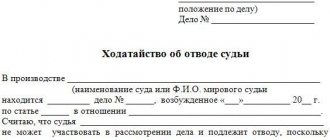Some questions related to registration at the place of residence (stay)
In accordance with Art. 27 of the Constitution of the Russian Federation, everyone who is legally present on the territory of the Russian Federation has the right to move freely, choose their place of stay and residence. Restrictions on this constitutional right of citizens are permitted only on the basis of law. The state carries out registration of citizens at the place of stay and place of residence within the Russian Federation. The registration bodies for citizens (Russian Federation and foreign citizens) at the place of stay and place of residence are territorial bodies authorized to carry out functions of control and supervision in the field of migration (Federal Migration Service).
Let us note that for foreign citizens and stateless persons, special rules for registration (migration) registration are established, which are provided for in the federal law of July 18, 2006 N 109-FZ “On migration registration of foreign citizens and stateless persons in the Russian Federation”.
According to the Law of the Russian Federation of June 25, 1993 N 5242-I, place of stay and residence means:
The place of stay is a hotel, sanatorium, rest home, boarding house, camping, tourist center, hospital, other similar institution, institution of the penal system that carries out punishments in the form of imprisonment or forced labor, as well as residential premises that are not the place of residence of a citizen, - in which he resides temporarily.
The place of residence is a residential building, apartment, service residential premises, specialized houses (dormitory, hotel-shelter, house of maneuverable fund, special home for single elderly people, boarding house for the disabled, veterans and others), as well as other residential premises in which a citizen permanently or primarily resides as an owner, under a lease (sublease), lease agreement or on other grounds provided for by the legislation of the Russian Federation.
The place of residence of a citizen belonging to the indigenous small people of the Russian Federation, leading a nomadic and (or) semi-nomadic lifestyle and not having a place where he permanently or primarily lives, in accordance with the Law, can be recognized as one of the settlements located in the municipal area, in within the boundaries of which the nomadic routes of a given citizen pass.
In our opinion, the topic of this article is relevant due to the fact that it concerns every person in the Russian Federation and, as a consequence, there is an abundance of litigation and opposing legal positions in judicial practice.
In this article we want to consider and analyze the judicial practice that exists today on some issues related to registration at the place of residence (stay) of both Russian citizens and foreign citizens.
(!) Some issues related to registration at the place of residence (stay) in relation to citizens of the Russian Federation.
The negligible area of the residential premises and the large number of people registered in it, can these circumstances be grounds for refusal to register at the place of residence (stay)?
In answer to this question, we note that judicial practice has developed in two directions: some courts do not consider these circumstances justified for refusing registration at the place of residence, while others believe that in this case the refusal is justified.
Example 1. Refusal is illegal!
Thus, the Plaintiff filed a petition in court to challenge the refusal of the department of the Federal Migration Service for the Sverdlovsk Region in the Ordzhonikidze district of Yekaterinburg to register at the place of residence.
The essence of the case: The Plaintiff applied to the “Center for Reception and Processing of Documents for Registration of Citizens at the Place of Residence and Place of Stay of the Ordzhonikidze District” with an application for registration at the place of residence in a residential building. The specified house is owned by citizen <FULL NAME1>, from whom there is also an application for registration of the Plaintiff at the place of temporary residence. With the application from the Plaintiff, the Federal Migration Service of Russia for the Sverdlovsk region in the Ordzhonikidze district of Yekaterinburg received all the documents necessary for registration. According to the “Center for Reception and Processing of Documents for Registration of Citizens at the Place of Residence and Place of Stay of the Ordzhonikidze District”, at the time of filing the application at this address, the total area was 43 square meters, there were 131 citizens registered at the place of residence (stay) in this residential premises Human. The plaintiff was given an explanation from the head of the department (K) that there was 0.33 square meters of living space per person registered in the house, and that living in such a negligibly small area was impossible. The application for registration at the place of residence was denied, since it is not possible to actually move into the specified house and live in it, and accordingly, having registration at this address, the Plaintiff will live at a different address.
In satisfying the appeal of the OUFMS of Russia for the Sverdlovsk region in the Ordzhonikidze district of Yekaterinburg, the court noted that in the Rules for registration and deregistration of citizens of the Russian Federation at the place of stay and at the place of residence within the Russian Federation (approved by Decree of the Government of the Russian Federation dated 17 July 1995 N 713) does not contain restrictions on sanitary standards of housing and does not regulate the number of square meters per person to resolve the issue of the possibility of registration. In connection with the above, the court found the refusal to register the Plaintiff at the disputed address, given by the head of the department, illegal (Appeal ruling of the Sverdlovsk Regional Court of August 30, 2012 No. 33-10533/2012).
Example 2. The refusal is justified.
Thus, R. filed a petition to declare illegal the decision of the head of the territorial office of the Federal Migration Service of Russia for St. Petersburg and the Leningrad Region to refuse registration at the place of residence.
The essence of the matter: R., on the basis of a gift agreement, is the owner of 1/100 of the share in the ownership of a three-room apartment with a total area of 64 square meters. m., which is confirmed by a certificate of state registration of rights. The plaintiff, as the owner of the residential premises, filed an application for registration at the place of residence. The head of the territorial point N of the department of the Federal Migration Service of Russia for St. Petersburg and the Leningrad Region refused to register R. at his place of residence. The refusal is motivated by the fact that as of <date> there are 20 citizens registered at this address, registration will be formal in nature and does not reflect the fact of moving into a residential premises with a total area of 64 square meters. m.
The court, refusing to satisfy R.'s claims, considered that 1/100 share in the ownership of a three-room apartment with a total area of 64 square meters. m, due to its insignificance in relation to the total area of the apartment, cannot be classified as a residential premises within the meaning of Art. 16 Housing Code of the Russian Federation; the applicant submitted to the Federal Migration Service an application for registration at the place of residence in a premises that was not objectively his place of residence and could not be either a place of residence or a place of stay, since there is no real possibility of living in it, since the owners of the said apartment are more than 15 people, not related to each other by family relations or property relations, the judicial panel believes that the registering authority reasonably refused to register R. at his place of residence in the apartment, and therefore there are grounds for recognizing as illegal the refusal of the head of the territorial office of the Federal Migration Service of Russia for St. Petersburg and the Leningrad Region to register R. is justified (Determination of the Leningrad Regional Court of August 15, 2012 N 33-3660/2012).
In our opinion and taking into account the current legislation, in the case under consideration, the registration authority’s refusal to register at the place of residence (stay) with an insignificantly small area of living space and a large number of people registered in it is not justified and does not comply with the law, for the following reasons in accordance with Article 6 of the Law Russian Federation “On the right of citizens of the Russian Federation to freedom of movement, choice of place of stay and residence within the Russian Federation”, registration of a citizen at the place of residence is defined as a notification procedure, the citizen is obliged to report a change of place of residence, and the registration authority is obliged to register the citizen at his place residence no later than three days after submitting documents for registration.
Restrictions on the right of citizens to choose their place of residence can only be established by federal law. The grounds for restricting the right to choose a place of residence are listed in Article 8 of the Law of the Russian Federation “On the right of citizens of the Russian Federation to freedom of movement, choice of place of stay and residence within the Russian Federation” (in the border strip, in closed military camps, in environmental disaster zones, in territories where a state of emergency or martial law has been introduced, in closed administrative-territorial entities) are exhaustive, and only they can serve as a prerequisite for the introduction of permit registration of citizens, which differs from notification registration.
Registration of a citizen at his place of residence or place of stay is an administrative act that only certifies the will of the citizen when choosing his place of residence or place of stay.
A citizen who has a share in the right of common shared ownership of a residential premises and applies for registration at his place of residence in the specified residential premises is not required to provide the written consent of the other co-owners of the specified residential premises.
The following civil case is indicative of this position.
Thus, the Plaintiff filed a lawsuit against Defendant 1 (individual), Municipal Unitary Enterprise “Housing and Communal Services of the Moscow Region r.p. Verkhneye Dubrovo" on recognizing the illegal registration of defendant 1 at the place of residence, entrusting the body that registers citizens at the place of stay and at the place of residence of defendant 1 to remove him from the registration register. The essence of the case: The plaintiff is the owner of 1/2 in the common shared ownership of a two-room apartment. This fact is confirmed by a certificate of state registration of rights. Defendant 1 is also the owner of 1/2 in the common shared ownership of a two-room apartment. This fact is confirmed by a certificate of state registration of rights. Based on the application for registration at the place of residence, Defendant 1 as the owner of 1/2 in the common shared ownership of a two-room apartment was registered at the place of residence in this apartment.
Refusing to satisfy the stated requirements of the Defendant 1, the court noted that in pursuance of clause 16 of the Rules for registration and deregistration of citizens of the Russian Federation at the place of stay and place of residence within the Russian Federation, defendant 1 submitted to the Municipal Unitary Enterprise “Housing and Communal Services r.p. Verkhneye Dubrovo" all documents necessary for registration, including a document confirming that Defendant 1 is the owner of 1/2 in the common shared ownership of a two-room apartment. Only if a citizen loses the right to a given residential premises or in the absence of such a right, he, in turn, in accordance with Article 7, paragraph 3 of the Law of the Russian Federation “On the right of citizens of the Russian Federation to freedom of movement, choice of place of stay and residence within the Russian Federation » is subject to deregistration at the specified address (Appeal ruling of the Sverdlovsk Regional Court dated March 1, 2013 No. 33-2014/2013).
Additionally, we would like to note that the Defendant in the case under consideration exercised his right to registration in the residential premises, which belonged to him by right of ownership in the manner prescribed by law.
When registering at the place of residence of persons who are not the owners of residential premises, it is necessary to have the will of all co-owners of this object to carry out the specified actions, expressed by their written application (consent) for registration.
The following civil case is indicative of this legal position. Thus, the Plaintiff filed a petition with the court to declare illegal the refusal of the Federal Migration Service for RO to register <FULL NAME1> at the place of residence, and the obligation of the Federal Migration Service for RO to register <FULL NAME1> at the place of residence.
The essence of the case: The plaintiff applied to the Federal Migration Service of Russia for the RO in the Proletarsky district of Rostov-on-Don with an application for registration of <FULL NAME1> at the place of residence. Based on the results of consideration of the application for registration at the specified place of residence, the answer was given that it is not possible to register <FULL NAME1> at the specified address due to the failure to provide documents confirming the ownership and use of property in shared ownership and the lack of consent of all co-owners of the home ownership .
Refusing to satisfy the plaintiff's claims, the court noted that the Plaintiff is the owner of a share of the residential building. The owner of other shares of the above residential building are <FULL NAME2> and <FULL NAME3>. Since there is no consent of all co-owners of the residential building, therefore there are no legal grounds to satisfy the Claimant’s demands for the obligation of the Federal Migration Service of Russia for the RO in the Proletarsky district of Rostov-on-Don to register <FULL NAME1> at the place of residence (Appeal ruling of the Investigative Committee for civil cases of the Rostov Regional Court dated October 8, 2012 in case No. 33-11764). We would like to note that in accordance with Art. 246 of the Civil Code of the Russian Federation, the disposal of property in shared ownership is carried out by agreement of all its participants.
Within the meaning of this article, in order to register at the place of residence of other persons in a residential building that is in common shared ownership, it is necessary to have the will of all co-owners of this residential premises to carry out these actions, expressed by their written application (consent) for registration.
(!) Some issues related to registration at the place of residence (stay) in relation to foreign citizens.
A foreign citizen violated the rules of migration registration by misleading the migration registration authorities regarding his place of residence and was expelled from the Russian Federation.
Thus, a foreign citizen appealed the decision of the judge of the Basmanny District Court of Moscow, which found him guilty of committing an administrative offense under Part 1 of Art. 18.8 of the Code of Administrative Offenses of the Russian Federation, and he was given an administrative penalty in the form of an administrative fine in the amount of 2,000 rubles with administrative deportation from the Russian Federation.
The essence of the case: <DATE, TIME>, at the address: <address 2> a citizen of the Republic of Uzbekistan was identified, who, upon arrival on the territory of the Russian Federation, sent a notification to the migration registration authorities that he would reside at the address: < address 1>, while in fact he lived at another address: <address 2>. The inspector of the PPM OUFMS of Russia for the city of Moscow in the Central Administrative District drew up a protocol on this foreign citizen regarding an administrative offense under Part 1 of Art. 18.8 Code of Administrative Offenses of the Russian Federation. The case was transferred to the Basmanny District Court of Moscow. By a decision of the judge of the Basmanny District Court of Moscow, a citizen of the Republic of Uzbekistan was found guilty of committing an administrative offense under Part 1 of Art. 18.8 of the Code of Administrative Offenses of the Russian Federation, and he was given an administrative penalty in the form of an administrative fine in the amount of 2,000 rubles with administrative deportation from the Russian Federation.
Refusing to satisfy the complaint of a foreign citizen, the court noted that <address 1> is not the place of residence of a citizen of the Republic of Uzbekistan. At that time, the latter chose <address 2> as his place of residence, where he was staying there illegally, therefore, he was aware of the illegal nature of his behavior, foresaw its harmful consequences and desired the occurrence of such consequences. A foreign citizen must know the relevant competent government services that resolve issues related to his temporary stay on the territory of the Russian Federation, as well as the current legislation of the Russian Federation regulating the legal status of foreign citizens (Decision of the Moscow City Court of May 22, 2012 in case No. 7- 906).
One should completely agree with these conclusions of the court because, in accordance with Art. 20 of the Federal Law of the Russian Federation N 109-FZ of July 18, 2006 “On migration registration of foreign citizens and stateless persons in the Russian Federation”, a foreign citizen, if staying at the place of stay, is obliged to register at the place of stay in the manner and under the conditions that established in accordance with this Federal Law or an international treaty of the Russian Federation. A foreign citizen temporarily residing or temporarily staying in the Russian Federation is subject to registration at the place of stay after seven working days from the date of arrival at the place of stay.
Thus, within the framework of the current legal regulation, the possibility of submitting a notification of arrival at the place of residence directly by a foreign citizen is not excluded, and, as a result, the obligation to submit the said notification does not rest solely with the receiving party, which is consistent with the requirement of Art. 20 of the above law.
In the case under consideration, a citizen of the Republic of Uzbekistan violated the rules of migration registration established by Art. 7, 14, 20 of the Federal Law of July 18, 2006 N 109-FZ “On migration registration of foreign citizens and stateless persons in the Russian Federation” and was completely legally and justifiably brought to administrative responsibility under Part 1 of Art. 18.8 Code of Administrative Offenses of the Russian Federation.
A citizen of the Russian Federation, with whom a foreign citizen actually lives, is the receiving party and is obliged, in turn, to notify the migration registration authority within 7 working days from the date of arrival of the foreign citizen. The following civil case is indicative of this legal position.
So, P.A.P. filed a complaint with the court against the decision in the case of an administrative offense, citing its illegality.
The essence of the matter: an inspector of the Federal Migration Service drew up a protocol on an administrative offense against Russian citizen P.A.P. This protocol states that when conducting a check on compliance with migration legislation at the address: <address 1> citizen of Uzbekistan E.M.T. actually lived without registration. P.A.P. did not submit a notification to the migration registration authority about the arrival of a foreign citizen at the place of stay, thereby committing an administrative offense provided for in Part 4 of Article 18.9 of the Code of Administrative Offenses of the Russian Federation.
The court rejected the applicant’s complaint, pointing out the presence in the actions of P.A.P. an administrative offense under Part 4 of Art. 18.9 of the Code of Administrative Offenses of the Russian Federation (Decision of the Supreme Court of the Republic of Mordovia dated November 2, 2012 N 7.2-93/12).
The court’s conclusion is fully consistent with the law since, by virtue of paragraph 2 of part 3 of Article 20 of the Federal Law of July 18, 2006 N 109-FZ “On migration registration of foreign citizens and stateless persons in the Russian Federation”, notification of the arrival of a foreign citizen at the place of stay must be submitted to the migration registration authority by the receiving party no later than seven working days from the date of his arrival at the place of stay - if this foreign citizen temporarily resides or is temporarily staying in the Russian Federation. In accordance with clause 7 of part 1 of article 2 of this Federal Law, the party receiving a foreign citizen may be a citizen of the Russian Federation with whom the foreign citizen actually resides or works (is).
Providing foreign citizens with conditions for temporary residence for the purpose of carrying out labor activities (carrying out work) by an organization that is not an employer (but is a counterparty of the employer of the above-mentioned foreign citizens) cannot lead to the definition of the specified organization as a receiving party.
To clarify this position, let us cite the following arbitration case as an example. Thus, LLC “Rudnik Kvartsevyy” applied to the Arbitration Court of the Magadan Region with a request to cancel the decision in the case of an administrative offense, according to which the applicant was found guilty of committing an administrative offense, liability for which is provided for in Part 4 of Article 18.9 of the Code of Administrative Offenses of the Russian Federation and a punishment was imposed in in the form of an administrative fine for each foreign citizen in the amount of 400,000 rubles, in total - 10,800,000 rubles. (27 x 400,000), which, taking into account Part 1 of Article 3.5 of the Code of Administrative Offenses of the Russian Federation, amounts to 1,000,000 rubles.
The essence of the matter: LLC "Rudnik Kvartsevy" (customer) and LLC "Svyatogor" (contractor) entered into a contract agreement to perform the work specified in the contract. In accordance with one of the terms of the contract, the customer undertakes to provide the contractor’s employees at the place of work with places to stay, food for the period of the workers’ stay and personal services. The customer organization fulfilled this obligation by placing the contractor’s employees in a rotation camp (the contractor’s employees were 27 citizens of the Republic of Armenia).
Based on the Report and in accordance with the Order of the Federal Migration Service of Russia for the Magadan Region, an unscheduled on-site verification of the company’s compliance with the rules for hiring foreign workers and mandatory notification of authorized government bodies about the employment of foreign citizens was carried out in relation to Rudnik Kvartsevy LLC (customer organization). During the inspection, a violation of the established procedure for the stay of foreign citizens on the territory of the Russian Federation was recorded, namely, failure to fulfill the duty of the host party in relation to 27 citizens of the Republic of Armenia. Based on the results of the inspection, a decision was made against the company to bring the latter to administrative liability under Part 4 of Art. 18.9 of the Code of Administrative Offenses of the Russian Federation in the form of a fine in the amount of 1,000,000 rubles.
Canceling the decision in the case of an administrative offense, the court indicated that from the systemic interpretation of paragraph 7 of part 1 of Article 2 of Federal Law N 109-FZ, it follows that the determining criterion for establishing the receiving party is the presence or absence of labor activity of a foreign citizen - in the case of a foreign citizen carrying out labor activity, the receiving party is the organization with which he actually carries out labor activity (is located), in the absence of labor activity, the receiving party is the organization with which the foreign citizen actually resides (Resolution of the Sixth Arbitration Court of Appeal dated June 15, 2012 N 06AP-1517/ 12).
In this case, we would additionally like to note that the contractor’s employees (Svyatogor LLC) performed work on the customer’s territory (Kvartsev Mine LLC) on a rotational basis. In accordance with Article 297 of the Labor Code of the Russian Federation, the rotation method is a special form of carrying out the labor process outside the place of permanent residence of workers, when their daily return to their place of permanent residence cannot be ensured. Since the obligation to carry out migration registration is due to the performance of work on a rotational basis in the relevant organization, therefore, the specified organization is the receiving party (contractor Svyatogor LLC), in accordance with Part 9 of Article 22 of Federal Law N 109-FZ, recording information about foreign citizens carrying out their labor activities in conditions of work on a rotational basis, is carried out by the administration of the relevant organization or institution upon the arrival and departure of these foreign citizens.
Individuals and legal entities that assist a foreign citizen in illegal stay (residence) in the Russian Federation by providing residential premises bear liability established by Part 3 of Article 18.9 of the Code of Administrative Offenses of the Russian Federation.
A clear example is the following civil case. Thus, ECO-INDUSTRY LLC applied to the Arbitration Court of the Kaluga Region with a statement to recognize as illegal the order of the Federal Migration Service for the Kaluga Region, the inspection report, the inspection results, the protocol on an administrative offense, the resolution on an administrative offense.
The essence of the case: on the basis of an order from the Federal Migration Service of Russia for the Kaluga Region, in order to exercise the functions of control and supervision over compliance with migration legislation, employees of the Department, together with OMON officers of the Ministry of Internal Affairs for the Kaluga Region, carried out an unscheduled inspection on the territory of the workshop for processing recyclable materials, owned by LLC "ECO-INDUSTRY" on on the basis of a lease agreement, during which a citizen of the Republic of Uzbekistan was identified on the territory of this workshop, who, since May 23, 2011, has been on the territory of the Russian Federation without registering for migration at her place of stay (residence). In fact, since July 29, 2011, the specified foreign citizen has been staying and living in premises on the territory of the workshop for processing recyclable materials of ECO-INDUSTRY LLC, without working at this enterprise.
Refusing the company's application, the court noted that the actual residence of a foreign citizen on the territory of the workshop is confirmed by the protocol of inspection of the premises, territories and things and documents located there belonging to a legal entity, the explanation of the foreign citizen, the explanation of the director of production of the Company, the protocol on an administrative offense, the workshop lease agreement .
The company, as a person who illegally provided accommodation for a foreign citizen who is on the territory of the Russian Federation without registering for migration at the place of stay, is the subject of an offense, liability for which is established by part 3 of Article 18.9 of the Code of Administrative Offenses of the Russian Federation
To summarize, we note the following. Regarding citizens of the Russian Federation.
According to the Constitution of the Russian Federation, restrictions on the right of citizens to freedom of movement are possible only on the basis of the provisions of federal law and only to the extent necessary to protect the foundations of the constitutional system, morality, health, rights and legitimate interests of other persons, ensuring the defense of the country and the security of the state. Article 8 of the Law of the Russian Federation of June 25, 1993 N 5242-I “On the right of citizens of the Russian Federation to freedom of movement, choice of place of stay and residence within the Russian Federation” provides an exhaustive list of grounds for restricting the right of citizens to freedom of movement, choice of place of stay and residence within the Russian Federation. This right can be limited only within the border strip, closed military camps, closed administrative territorial entities, zones of environmental disaster, in certain territories and in populated areas where there is a danger of the spread of infectious and widespread non-infectious diseases, if special conditions and regime are introduced there residence of the population and economic activity, as well as in the event of a state of emergency or martial law being introduced in any territory.
However, migration registration authorities often refuse registration at the place of residence or stay to citizens of the Russian Federation, citing by-laws, and thus give registration at the place of residence (stay) a permitting procedure, but in accordance with the current legislation, namely Art. 6 of the above law, this procedure is defined as a notification procedure, which is mandatory for everyone.
To eliminate mass registrations in small-sized residential premises, for the purposes of ordinary formality, the legislator needs to introduce the necessary norms into the current legislation.
We would like to note that citizens who own shares in a residential premises are not required, if they are registered at the place of residence (stay) in this residential premises, to obtain written consent from other co-owners, however, in the absence of such a share, such consent is mandatory, according to Art. 246 of the Civil Code of the Russian Federation.
Regarding foreign citizens.
A foreign citizen, as well as the receiving party (an individual or organization with whom a foreign citizen actually resides), is obliged to submit a notification of his arrival to the migration registration authorities, since the current legal regulation does not exclude the possibility of a foreign citizen submitting a notification of arrival at the place of stay directly and As a consequence, the obligation to provide said notice does not rest solely with the receiving party. We also need to note in this article that the organization does not bear the responsibility of the host if it provides conditions for temporary residence for a foreign employee of its counterparty.
List of sources used by the author in preparing this article:
Regulations
- Constitution of the Russian Federation (adopted by popular vote on December 12, 1993) (as amended on December 30, 2008) // Access from information and legal support Guarantor;
- Housing Code of the Russian Federation dated December 29, 2004 N 188-FZ//Access from information and legal support Guarantor;
- Civil Code of the Russian Federation, part one of November 30, 1994 N 51-FZ//Access from information and legal support Guarantor;
- Code of the Russian Federation on Administrative Offenses of December 30, 2001 N 195-FZ//Access from information and legal support Guarantor;
- Labor Code of the Russian Federation of December 30, 2001 N 197-FZ (Labor Code of the Russian Federation)//Access from information and legal support Guarantor;
- Federal Law of July 18, 2006 N 109-FZ “On migration registration of foreign citizens and stateless persons in the Russian Federation”//Access from information and legal support Guarantor;
- Law of the Russian Federation of June 25, 1993 N 5242-I “On the right of citizens of the Russian Federation to freedom of movement, choice of place of stay and residence within the Russian Federation” // Access from information and legal support Guarantor;
- Decree of the Government of the Russian Federation of July 17, 1995 N 713 “On approval of the Rules for registration and deregistration of citizens of the Russian Federation at the place of stay and place of residence within the Russian Federation and the list of officials responsible for registration” // Access from information legal support Guarantor.
Arbitrage practice
- Appeal ruling of the Sverdlovsk Regional Court dated August 30, 2012. N 33-10533/2012//Access from information and legal support Guarantor;
- Appeal ruling of the Sverdlovsk Regional Court dated March 1, 2013. N 33-2014/2013//Access from information and legal support Guarantor;
- Determination of the Leningrad Regional Court of August 15, 2012 N 33-3660/2012//Access from information and legal support Guarantor;
- Appeal ruling of the Investigative Committee for civil cases of the Rostov Regional Court dated October 8, 2012 in case No. 33-11764 // Access from information and legal support Guarantor;
- Decision of the Moscow City Court of May 22, 2012 in case No. 7-906 // Access from information and legal support Guarantor;
- Decision of the Supreme Court of the Republic of Mordovia dated November 2, 2012 N 7.2-93/12//Access from information and legal support Guarantor;
- Resolution of the Sixth Arbitration Court of Appeal dated June 15, 2012 N 06AP-1517/12//Access from information and legal support Guarantor.
Document confirming registration at place of residence
Even a quick review of the Internet shows that users quite often type the phrase “document confirming registration at the place of residence.”
Let's try to answer this question. Before talking about documents confirming registration at the place of residence, it is worth defining the place of residence.
What is the place of residence where registration takes place? According to Article 20 of the Civil Code of the Russian Federation, place of residence is the place where a person primarily lives.
The Soviet word “propiska” has been replaced by the word registration since 1993. Currently, there are two types of registration: registration at the place of residence and registration at the place of stay.
The first implies permanent registration, and the second (registration at the place of residence) - temporary registration. Registration of citizens at the place of residence is an analogue of the registration registration that existed in Soviet times.
List of documents that confirm place of permanent residence
1. Passport of a citizen of the Russian Federation. A passport is the first and main document that confirms registration at the place of residence. A special note is made in the passport in the “Place of Residence” section. A stamp is made indicating the address and date when the citizen was registered.
2. Certificate of ownership of the apartment or an extract from the Unified State Register of Real Estate. Currently, the issuance of certificates of ownership has been cancelled. From July 15, 2021, the transfer of rights to real estate is certified by an extract from the Unified State Register of Real Estate (USRN).
3. Certificate in form No. 9. Certificate in form No. 9 – certificate of registration at the place of residence. One of the most common types of certificates.
Help contains:
- Last name, first name and patronymic of the recipient of the document;
- A list of all registered persons at a given address, indicating the date of birth and relationship;
- Data about this living space: number of rooms, area, type of property.
You can obtain a certificate from the district departments of settlement and registration of citizens. The extract is issued on the day of application upon presentation of a passport and title documents. In certain cases, the certificate has a validity period. If it is needed to obtain a mortgage loan, then its validity period is one month from the date of issue. If it is provided to an organization or authority to confirm information, then the duration of the certificate is not so important.
4. An extract from the house register, which contains information about all persons registered in this living space;
5. Lease agreement if there is no other document confirming the fact of registration. Such a document cannot be considered a document confirming registration at the place of residence. But the lease agreement provides grounds for the exercise of this right and indicates the place of residence.
6. A court decision recognizing a citizen’s right to use premises for residence and subsequent registration, if there is no other document confirming the fact of registration. A court decision is not a document confirming the fact of registration at the place of residence, but it provides the basis for its implementation.
A document confirming the registration of the child at the place of residence
The place of residence of a child under 14 years of age is considered to be the place of residence of his parents. The document confirming its registration is a birth certificate with a stamp confirming completion of the registration procedure, as well as all the documents listed above: a certificate in form No. 9, an extract from the house register.
Good luck! Galina Cherkis








